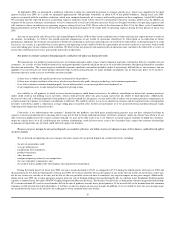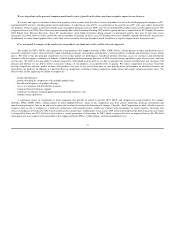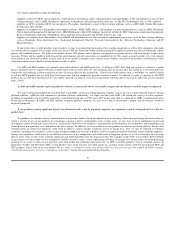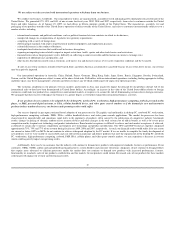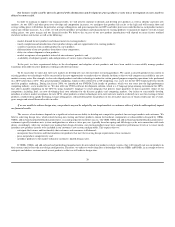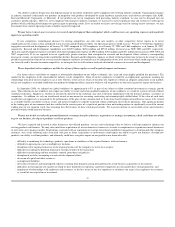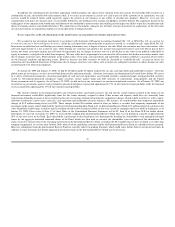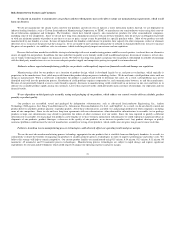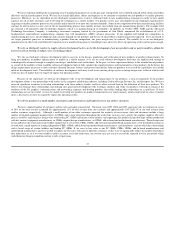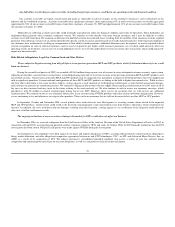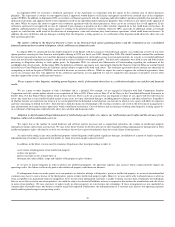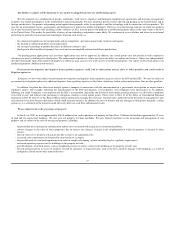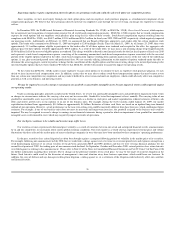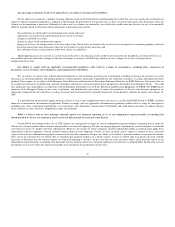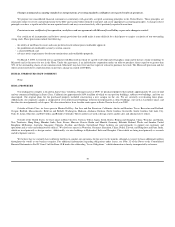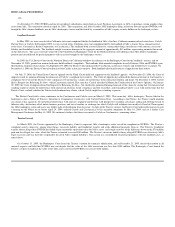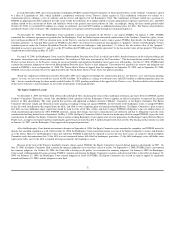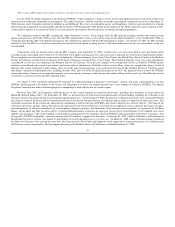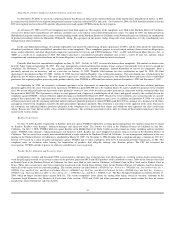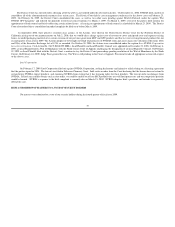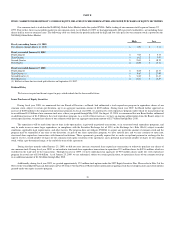NVIDIA 2008 Annual Report Download - page 29
Download and view the complete annual report
Please find page 29 of the 2008 NVIDIA annual report below. You can navigate through the pages in the report by either clicking on the pages listed below, or by using the keyword search tool below to find specific information within the annual report.
In September 2008, we executed a settlement agreement, or the Agreement, in connection with the claims of the certified class of direct purchaser
plaintiffs. The Agreement is subject to court approval and, if approved, would dispose of all claims and appeals raised by the certified class in the complaints
against NVIDIA. In addition, in September 2008, we reached a settlement agreement with the remaining individual indirect purchaser plaintiffs that provides for a
dismissal of all claims and appeals related to the complaints raised by the individual indirect purchaser plaintiffs. This settlement is not subject to the approval of
the court. While we expect the courts to approve the settlement agreement with the direct purchasers, there can be no assurance that it will approved. If the
settlement agreement is not approved we may be required to pay damages or penalties or have other remedies imposed on us that could harm our business. In
addition, additional parties may bring claims against us relating to the potential antitrust violations related to GPUs and cards. If additional claims are brought
against us, such lawsuits could result in the diversion of management
’
s time and attention away from business operations, which could harm our business. In
addition, the costs of defense and any damages resulting from this litigation, a ruling against us, or a settlement of the litigation could adversely affect our cash
flow and financial results.
The matters relating to the Board of Director
’
s review of our historical stock option granting practices and the restatement of our consolidated
financial statements have resulted in litigation, which could harm our financial results.
In August 2006, we announced that the Audit Committee of our Board, with the assistance of outside legal counsel, was conducting a review of our stock
option practices covering the time from our initial public offering in 1999, our fiscal year 2000, through June 2006. The Audit Committee reached the conclusion
that incorrect measurement dates were used for financial accounting purposes for stock option grants in certain prior periods. As a result, we recorded additional
non
-
cash stock
-
based compensation expense, and related tax effects, related to stock option grants. Ten derivative complaints were filed in state and federal court
pertaining to allegations relating to stock option grants. In September 2008, we entered into Memoranda of Understanding regarding the settlement of the
stockholder derivative lawsuits. In November 2008, the definitive settlement agreements were concurrently filed in the Chancery Court of Delaware and the United
States District Court Northern District of California and are subject to approval by both such courts. The settlement agreements do not contain any admission of
wrongdoing or fault on the part of NVIDIA, our board of directors or executive officers. While we expect the courts to approve the settlement agreements, there
can be no assurance that they will approved. If the settlement agreements are not approved we may be required to pay damages or penalties or have other
remedies imposed on us that could harm our business.
We are a party to other litigation, including patent litigation, which, if determined adversely to us, could adversely affect our cash flow and financial
results.
We are a party to other litigation as both a defendant and as a plaintiff. For example, we are engaged in litigation with Intel Corporation, Rambus
Corporation and with various parties related to our acquisition of 3dfx in 2001. Please refer to Note 12 of the Notes to the Consolidated Financial Statements in
Part IV, Item 15 of this Form 10
-
K for further detail on these lawsuits. There can be no assurance that any litigation to which we are a party will be resolved in our
favor. Any claim that is successfully decided against us may cause us to pay substantial damages, including punitive damages, and other related fees. Regardless
of whether lawsuits are resolved in our favor or if we are the plaintiff or the defendant in the litigation, any lawsuits to which we are a party will likely be expensive
and time consuming to defend or resolve. Such lawsuits could also harm our relationships with existing customers and result in the diversion of management
’
s
time and attention away from business operations, which could harm our business. Costs of defense and any damages resulting from litigation, a ruling against us,
or a settlement of the litigation could adversely affect our cash flow and financial results.
Litigation to defend against alleged infringement of intellectual property rights or to enforce our intellectual property rights and the outcome of such
litigation could result in substantial costs to us.
We expect that as the number of issued hardware and software patents increases and as competition intensifies, the volume of intellectual property
infringement claims and lawsuits may increase. We may in the future become involved in lawsuits or other legal proceedings alleging patent infringement or other
intellectual property rights violations by us or by our customers that we have agreed to indemnify them for certain claims of infringement.
An unfavorable ruling in any such intellectual property related litigation could include significant damages, invalidation of a patent or family of patents,
indemnification of customers, payment of lost profits, or, when it has been sought, injunctive relief.
In addition, in the future, we may need to commence litigation or other legal proceedings in order to:
If we have to initiate litigation in order to protect our intellectual property, our operating expenses may increase which could negatively impact our
operating results. Our failure to effectively protect our intellectual property could harm our business.
If infringement claims are made against us or our products are found to infringe a third parties
’
patent or intellectual property, we or one of our indemnified
customers may have to seek a license to the third parties
’
patent or other intellectual property rights. However, we may not be able to obtain licenses at all or on
terms acceptable to us particularly from our competitors. If we or one of our indemnified customers is unable to obtain a license from a third party for technology
that we use or that is used in one of our products, we could be subject to substantial liabilities or have to suspend or discontinue the manufacture and sale of one
or more of our products. We may also have to make royalty or other payments, or cross license our technology. If these arrangements are not concluded on
commercially reasonable terms, our business could be negatively impacted. Furthermore, the indemnification of a customer may increase our operating expenses
which could negatively impact our operating results.
·
assert claims of infringement of our intellectual property;
·
enforce our patents;
·
protect our trade secrets or know
-
how; or
·
determine the enforceability, scope and validity of the propriety rights of others.
26


